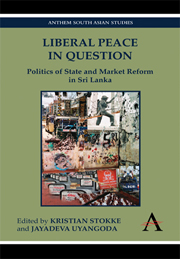Book contents
- Frontmatter
- Contents
- List of Illustrations
- List of Contributors
- 1 Liberal Peace in Question: The Sri Lankan Case
- 2 Travails of State Reform in the Context of Protracted Civil War in Sri Lanka
- 3 Fallacies of the Peace Ownership Approach: Exploring Norwegian Mediation in Sri Lanka
- 4 The Politics of Market Reform at a Time of Ethnic Conflict: Sri Lanka in the Jayewardene Years
- 5 From SIHRN to Post-War North and East: The Limits of the ‘Peace through Development’ Paradigm in Sri Lanka
- 6 Buying Peace? Politics of Reconstruction and the Peace Dividend Argument
- 7 Women's Initiative in Building Peace: The Case of Northern Sri Lanka
- 8 Liberal Peace and Public Opinion
- Notes
- References
1 - Liberal Peace in Question: The Sri Lankan Case
Published online by Cambridge University Press: 05 March 2012
- Frontmatter
- Contents
- List of Illustrations
- List of Contributors
- 1 Liberal Peace in Question: The Sri Lankan Case
- 2 Travails of State Reform in the Context of Protracted Civil War in Sri Lanka
- 3 Fallacies of the Peace Ownership Approach: Exploring Norwegian Mediation in Sri Lanka
- 4 The Politics of Market Reform at a Time of Ethnic Conflict: Sri Lanka in the Jayewardene Years
- 5 From SIHRN to Post-War North and East: The Limits of the ‘Peace through Development’ Paradigm in Sri Lanka
- 6 Buying Peace? Politics of Reconstruction and the Peace Dividend Argument
- 7 Women's Initiative in Building Peace: The Case of Northern Sri Lanka
- 8 Liberal Peace and Public Opinion
- Notes
- References
Summary
Sri Lanka has repeatedly gained international attention among scholars of politics and development as an illustrative case of development theory and practice. This was initiated with Sri Lanka's strong emphasis on importsubstitution industrialisation and social welfare in the 1960s and 70s, but the country also gained critical attention for its shift to economic liberalisation in 1977 as well as the subsequent coexistence of neoliberalism, authoritarianism and armed insurgencies in the 1980s. The last decade has seen a new focus on Sri Lanka as a test case for internationalised conflict resolution and liberal peacebuilding in protracted intrastate conflicts. The final attempt at negotiating an end to the armed conflict between the Government of Sri Lanka (GOSL) and the Liberation Tigers of Tamil Eelam (LTTE) was characterised by active involvement by a range of international actors as facilitators, donors and monitors of liberal peace. From being an intrastate conflict that was of little relevance beyond the South Asian sub-continent, Sri Lanka became a test for liberal peacebuilding facilitated and funded by the US-led ‘international community’ (Goodhand and Klem 2005, Liyanage 2008, Lunstead 2007). As the peace process broke down and was replaced by an intense and successful military campaign by the government, Sri Lanka has been seen by some as providing evidence of the possibility of defeating ‘terrorism’ and creating peace by military means. Other observers emphasise that the final stage of the conflict demonstrates the changing geopolitics of the Indian Ocean and an emerging new politics of security and order as well as the injustice and humanitarian costs of a victor's peace.
- Type
- Chapter
- Information
- Liberal Peace in QuestionPolitics of State and Market Reform in Sri Lanka, pp. 1 - 34Publisher: Anthem PressPrint publication year: 2011
- 1
- Cited by



